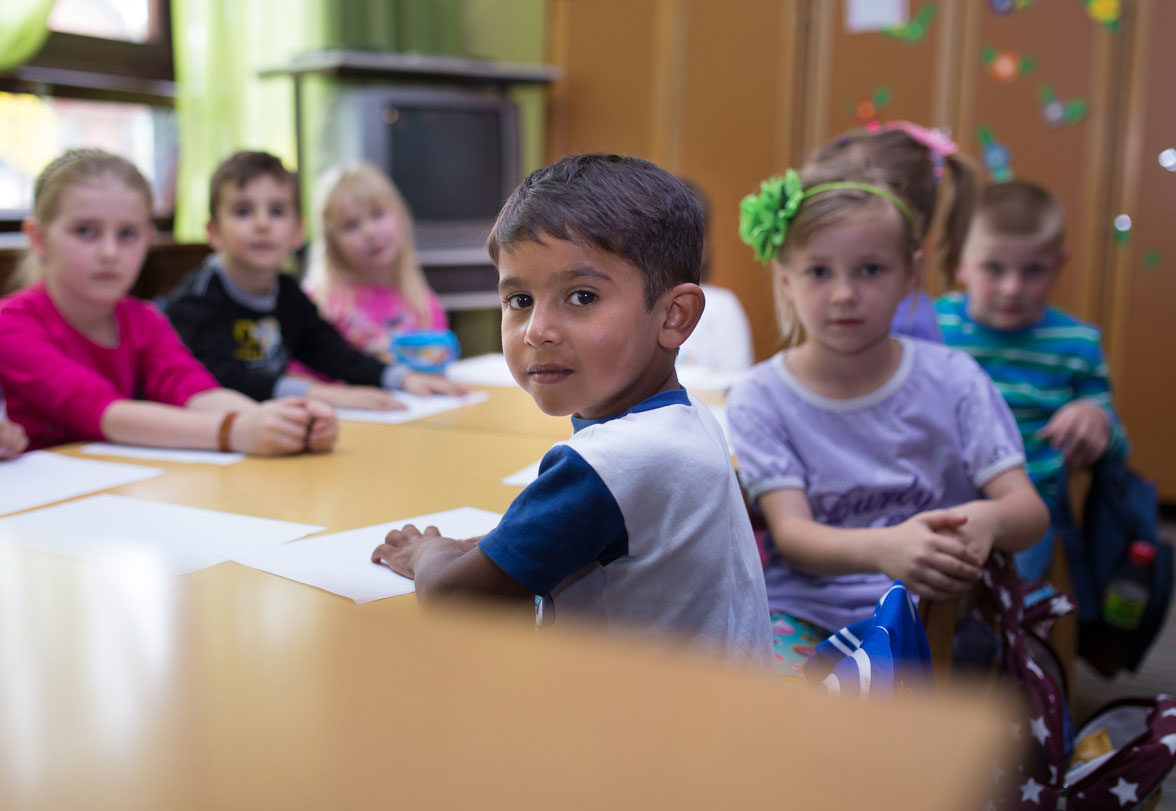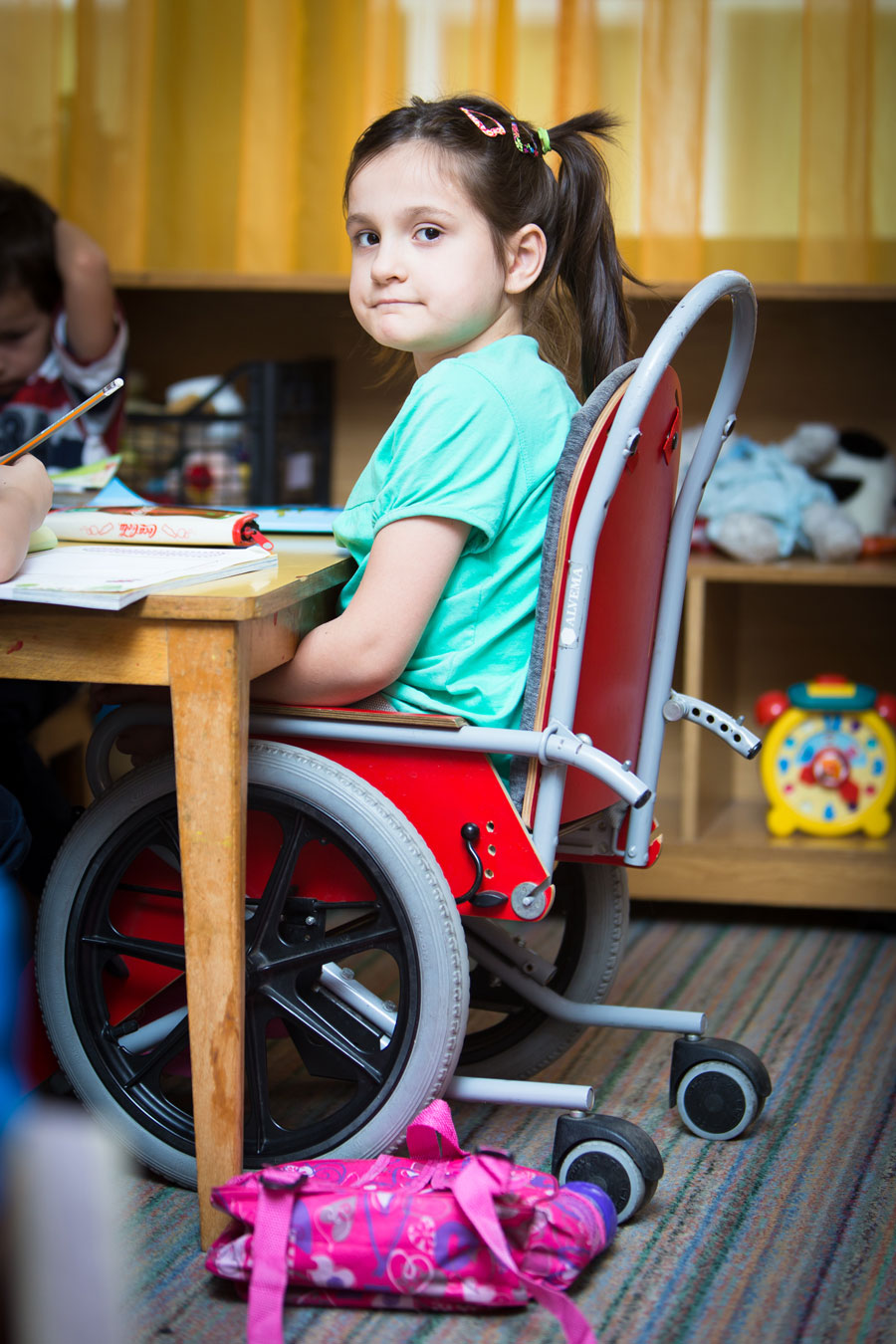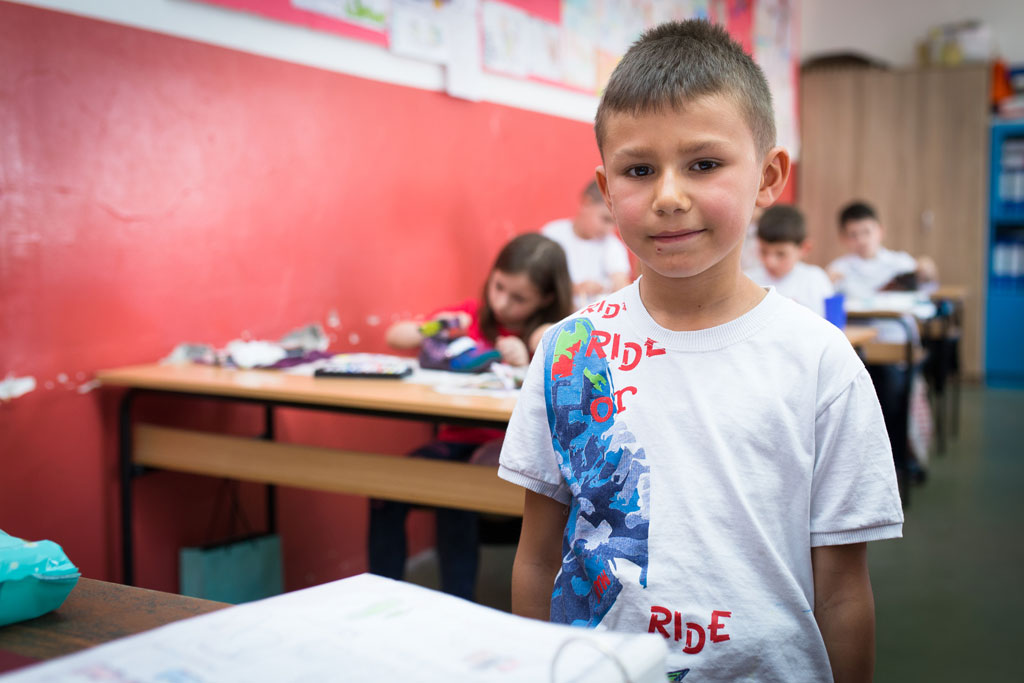 North West Balkans
North West Balkans
Languages
Defying exclusion – every last child deserves a good start

To be born deaf mute is hard enough. To be born deaf mute into a Roma family adds another layer of difficulty. And if that family is mostly illiterate, that’s down right impossible. Yet, this is the life of Kerim*, 6 year-old boy from industrial and mining city of Kakanj, central Bosnia and Herzegovina (B-H).
Once an area from which Bosnian Kingdom rulers managed their affairs, Kakanj municipality today has over 38,000 residents and unemployment rate higher than 50%. This is also one of the municipalities with high number of Roma, the biggest ethnic minority in B-H.
Kerim's story best illustrates why we are campaigning for excluded children – we only want the world - his family, his community, health care institution, school administration, social centre - to see him, to understand his needs and give him a boost he needs. And he could achieve a lot, if given a chance. He was lucky enough to be enrolled in obligatory pre-school program in a state-owned kindergarten. At classes, he shows great enthusiasm and completes most of the tasks by only watching what other children are doing and mimicking them. He is all smiles and „can-do“ attitude, but this is where his progress will abruptly stop. Namely, his mother Sabina tells us she was told Kerim can't go to primary school in Kakanj, as they have no capacity to work with him, so they were told he has to go to school in Sarajevo, 50 kilometres away. In a family with 5 children, where two already dropped out of school before even completing the first grade, with no employed adults, chances are that he will stay at home.
“If social welfare centre doesn’t help me, how will I send him to school? And he needs to go to school to learn his language (sign language), so he can communicate. I wish he could at least learn how to write, he will need that, wherever he goes, no one will be able to understand what he wants unless he can communicate,” says Sabina. The only steady income their family has is a disability pension Kerim* receives, in the amount of 109 Convertible Marks, approximately 50 Euros per month.
Sabina can’t read or write. She was enrolled in school in the early ‘90s, but then the war started and she dropped out.
Quality preschool education for all children
Statistics show that children that attend preschool education programs are less likely to drop out of school later. We are campaigning for all children to have equal access to quality preschool education, proven to be highly beneficial for child development on many accounts.
Even 20 years after the war, Bosnia and Herzegovina is still heavily burdened with national divisions, complex political and state structure, underdeveloped economy and social injustice. In such a setting, preschool education, and education in general, rarely makes the headlines or priority lists.
European rate of enrolment of children into preschool education is as high as 93%, while B-H’s rate amounts to only 14.4%, and even more alarmingly – the enrolment rate for most excluded categories of children – children with disabilities, national minorities, children from rural areas, children living in poverty and children without parental care is only 2%.
Seeing beyond disability
In Kakanj we also met Merjem, 8 year old girl in a wheel-chair, with paralysis of the lower part of the body. Even though she has no intellectual difficulties, she is late with school enrolment because she had to undergo a series of surgeries in the past years. She is excited to attend the preschool program and is eager to learn new things and make new friends. And, it's not easy.

Other children are confused by her appearance in a wheelchair, and easily abandon her when they need to move, as she is not fast as they are. They also get a little bit jealous, as the teacher has to pay a little bit more attention to her.
“It is almost impossible to make any progress in a class with 22 children, because other children are discriminating her unknowingly. They see her as the group’s handicap. I try to include her, to explain to other children it’s not her fault she is disabled, to motivate them to accept her as a classmate and their friend, that she is the same as them, and that she just can’t walk. If they don’t want to work or play with her, she loses interest in what we are doing and she withdraws, only passively watching what is going on,” describes Velid Halilović, teacher in “Mladost” Kakanj public kindergarten.
Merjem's mother Nizama is hopeful that preschool program will help Merjem to adapt and prepare for school. “She likes going to preschool, she comes home and talks about what they were doing. She likes to write, she talks a lot...” She is also hopeful that Merjem will walk in the future. “No one told me she wouldn’t walk, everyone was positive she would. So, we are waiting...” Yet, there are not available exercise programs for Merjem in Kakanj, and with her father’s modest salary, they cannot afford travelling elsewhere to help her stand on her feet.
Preschool in the woods
Another group of excluded children is certainly children from rural areas. With poor road connections, lack of conditions to hold classes in the areas where they live, rural children are either excluded from preschool education or are attending classes with great difficulties.
“One of the schools I am working in is actually about 10 square meters room, with no lighting, heating, and it’s in the middle of the wood. And yet, children from rural areas show great motivation to learn. Most of them have never even seen any school materials before these classes,” says Halilović.
Bad economic situation in the country also caused birth rate to drop down. That represents another challenge for the education institutions, esspecially in the rural areas, since this means that schools that once had dozens of students, now have no more than 5-6 students, all different grades, and one teacher.
“We have children that have to use public transport to come to classes. But, the issue is that the bus lines are not regular or frequent. So we have situations where parent can bring the child by bus at 6am, and the preschool program starts at 5pm, which is when they have the last bus to return to their home. Another issue is the combined classes, where one teacher simultaneously works with 5-6 children that are in different grades. Imagine a child that comes to preschool in such classroom,” says ''Mladost'' Kakanj kindergarten director Helmina Murtić.
For the preschool program, Murtić says that these obligatory 150 hours aren’t sufficient, but they are still a good basic preparation for school. “They come for three hours every day, for 10 weeks. We work with children to develop their working habits, teamwork skills, hygiene habits... Results of early childhood care and development are visible throughout the life of an individual”, she concludes.
Visible results
Obligatory preschool education has only been implemented for several years now in Bosnia and Herzegovina. To assess the benefits, we also visited primary school “Hamdija Kresevljakovic” in Kakanj. Here we met Faris, 7-year old Roma student, who attended preschool program last year. His teacher, Marizela Terzic, says he stood out the first week she met him.
“I was very glad to see how bright and interested he is, especially since he belongs to a group that is often neglected or excluded. He came to school ready and he makes progress continuously. He regularly attends classes, does his homework, helps other children... As his mother is illiterate, he works at home alone, practices reading on his own, and even reads for his mother,” says Terzic.

Faris shyly leads us through his school portfolio, showing us his works. He also told us he practices football in a local football club “Rudar” and that is what he wants to do when he grows up. His mother Indira says when he gets back home, he first does his homework, and then everything else. “I was surprised how much he likes school and how successful he is. He likes math, Bosnian language... Preschool program helped a lot, I wouldn’t be able to prepare him so well for school.“
Preschool education has a significant role in every child’s life, it is the first step towards education, where children acquire basic skills and develop physically, intellectually, emotionally and socially, stresses the Pedagogue in primary school “Hamdija Kresevljakovic”, Delila Rajkic. “I had the opportunity to observe both the children who attended preschool education and the children who didn’t, and there are significant differences. We used to have children crying, afraid to make contact with large group of children or adults they don’t know. Now, children who attended preschool program have already passed these barriers, they come to school with developed work skills, and achieve better results.”
Our pledge
Save the Children is present in B-H since 1996. All this time, we have been working to help children stay protected, making sure their rights are respected and that they have access to quality inclusive education. In the next three years we will make additional efforts to reach excluded children, children who are forgotten more often than not. We will ask all – governments, social and education institutions to make sure all children have a good start.
*children names are changed in order to protect their identity
Photo credits: Save the Children/Agdal Nuhanovic